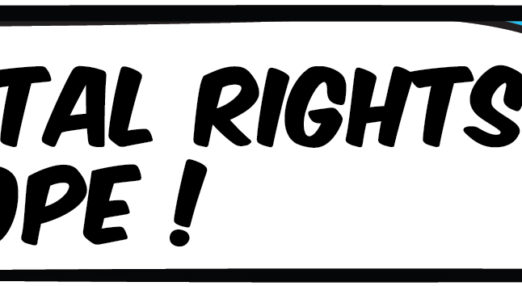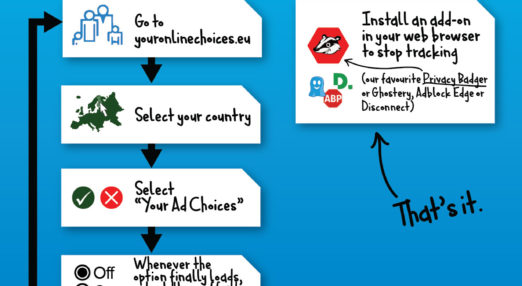Our work
EDRi is the biggest European network defending rights and freedoms online. We work to to challenge private and state actors who abuse their power to control or manipulate the public. We do so by advocating for robust and enforced laws, informing and mobilising people, promoting a healthy and accountable technology market, and building a movement of organisations and individuals committed to digital rights and freedoms in a connected world.
Filter resources
-

UN report on copyright – is the EU really a beacon of human rights?
Copyright has seen a spectacular rise in importance, both politically and legally, in recent decades. The digitisation of cultural and scientific goods has led many rights holders to see strengthened copyright protection as the only means of ensuring the survival of the cultural industry. To a large extent the rights holders’ quest for more legal […]
Read more
-

Did GCHQ spy on you? Find out now!
Since its launch on 16 February 2015, over 25 000 people have joined an international campaign to try to learn whether Britain’s intelligence agency, GCHQ, illegally spied on them. This opportunity is possible thanks to court victory in the Investigatory Powers Tribunal (IPT), a secret court set up to hear complaints against the British Security […]
Read more
-

European Parliament failing to support copyright reform
Everyone is talking about EU copyright reform. However, in the European Parliament, everyone is having the same discussions on enforcement that they were having ten years ago – and talking about stopping any reform. The Draft Report “Towards a renewed consensus on the enforcement of Intellectual Property Rights: An EU Action Plan” (2014/2151(INI)) presented by […]
Read more
-
Booklet: Activist guide to the Brussels maze 2.0
The purpose of this booklet is to provide activists with an insight into where EU legislative and non-legislative proposals come from, what can be achieved at each stage of the administrative process. As the lifetime of any EU Proposal of any description is very long, it is important to know where to target any activity […]
Read more
-

Macedonia: Massive surveillance revelation: 20 000 people wiretapped
On 10 February, EDRi-member Metamorphosis, expressed grave concern about the publicly announced allegations of mass and unauthorised surveillance of citizens. Invasions of privacy directly affect freedom of expression in Macedonia, and fuel the overall climate of fear and silence. On 9 February 2015, the Macedonian opposition leader Zoran Zaev held a press conference in Skopje, […]
Read more
-

Finnish BB Awards to Commissioner Paatero, Police Board and Microsoft
On 31 January, EDRi-member Electronic Frontier Finland (Effi) presented the Finnish Big Brother Awards 2015. The Awards are based on a concept created by Privacy International in the UK. The tradition started in 1998 in London, and the awards are given in about a dozen countries annually. The goal is to draw attention to violations […]
Read more
-

UK court finds secret spying docs made surveillance illegal
Several human rights groups are celebrating a major victory against the Five Eyes, an intelligence alliance comprising Australia, Canada, New Zealand, the UK and the US, as the UK surveillance tribunal ruled on 6 February that the Government Communications Headquarters (GCHQ) acted unlawfully in accessing millions of private communications collected by the National Security Agency […]
Read more
-

Netherlands: Two telcos fined for net neutrality violations
This article is also available in: Deutsch: Niederlande: Bußgeld wegen Verletzung der Netzneutralität In January 2013, the net neutrality provisions in the Dutch telecommunications law took effect. Article 7.4a guarantees net neutrality, and in principle prohibits providers of public electronic communication networks which deliver internet access services and providers of internet access services from hindering […]
Read more
-

Copyright Reform: Responses to Draft Report and what comes next
This article is also available in: Deutsch: EU-Urheberrechtsreform: Antwort auf den Berichtsentwurf The draft European Parliament report on the InfoSoc Directive, sometimes also called the Copyright Directive, has generated an enormous wave of responses. It was presented by the Member of the Parliament (MEP) responsible for leading the file, Julia Reda, to the Committee on […]
Read more
-

ISDS – one month after the results of the public consultation
National sovereignty of the EU Member States and the rule of law would be endangered if Investor-State Dispute Settlement (ISDS) was part of the Transatlantic Trade and Investment Partnership (TTIP). Respondents to the public consultation conducted by the European Commission (EC) between March and July 2014 made it clear that they oppose ISDS, but the […]
Read more
-

Facing a challenge – understanding Facebook’s opt-out instructions
Following Facebook’s new changes in its terms of service, the company has provided a public relations pitch about “your information” and how Facebook “respects the choices that you make” about the advertising that you see. In particular, it says “That’s why Facebook respects the choices you make about the ads you see, across every device. […]
Read more
-

Yet another internet blocking law in Turkey
This article is also available in: Deutsch: Neues Gesetz über Internetsperren in der Türkei In recent years, online censorship and the deteriorating situation regarding the freedom of speech has raised serious concerns in Turkey. The large majority of the traditional mainstream media is either directly or indirectly under the government control, and the Internet remains one […]
Read more
